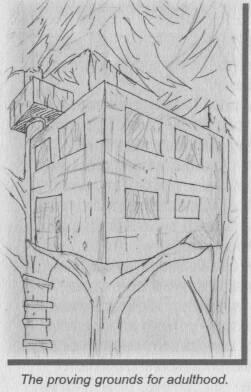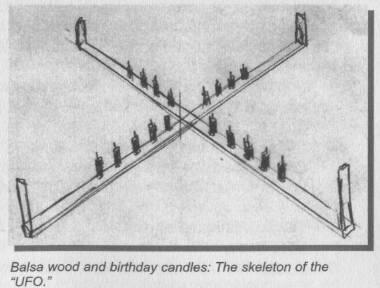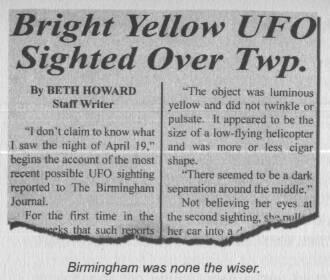If Chins Could Kill: Confessions of a B Movie Actor (4 page)
Read If Chins Could Kill: Confessions of a B Movie Actor Online
Authors: Bruce Campbell
Tags: #Autobiography, #United States, #General, #Biography & Autobiography, #Biography, #Entertainment & Performing Arts - General, #Entertainment & Performing Arts, #Actors, #Performing Arts, #Entertainment & Performing Arts - Actors & Actresses, #1958-, #History & Criticism, #Film & Video, #Bruce, #Motion picture actors and actr, #Film & Video - History & Criticism, #Campbell, #Motion picture actors and actresses - United States, #Film & Video - General, #Motion picture actors and actresses
His plan was to make a mobile war machine that could presumably attack things and/or people. Taking into account all materials needed to build the tank, including plywood, two-by-fours, steering wheel, gun barrel, catapult, rubber slings, mirrors, fan belts and a pulley system, Mike estimated that the total weight would be 387½ pounds with occupants. I'll bet he wasn't far off. The only scheme that never came to bear was mounting the damn thing on Dad's riding lawnmower.
To defend against attacking neighbors, we armed ourselves with cracker balls, rolls of caps, sparklers, balloons, squirt guns, sling shot rifles, rubber band shooters and the dreaded Ivory Liquid detergent bottles -- the Super Soaker of their day. We used to beg Mom to buy the Ivory brand bottles because they had the best nozzles and could blast water the farthest. Mike was the best at this, because his hands were stronger. With a good squeeze, he could drench Don or me from twenty feet away. Over time, we learned to rinse the bottles out well -- a soapy shot in the eye could ruin your whole afternoon.
The experience of building the tank only fueled other summer projects -- like the tunnel. To protect ourselves from parental meddling, we always referred to it by the backward code name of "Lennut."
The first challenge was to choose a good dig site. To insure privacy, we picked a spot in the adjacent woods, but we had to be careful because tunneling too close to a large tree meant hassling with roots. Once we had the site, we excavated a horizontal trench and reinforced the sides with two-by-fours. This was then covered with plywood, six inches of dirt and plenty of camouflage. Now, we could begin digging the main shaft, which went straight down, until we hit water. To communicate with the outside world, a garden hose was lowered through a hole in the roof.
Play time in the "Lennut" was anything but -- it was backbreaking work. After school, on weekends and even during vacations, we'd dig with hand trowels, chop and burn off roots, reinforce the walls, then dig some more. To provide a better working environment, Mike came up with an ingenious method of providing candlelight in a series of carved alcoves and even manufactured glow-in-the-dark candles from phosphorescent crayons.
Eventually, Don squealed about the use of candles, which was forbidden, and Dad gave the order to fill it in. We obeyed, but soon thereafter, Mike built a doghouse, supposedly for our basset hound, but it was ultimately just a front for a hidden tunnel entrance and we started the process all over again.
Most kids came home at lunch with grass stains. Mike, Don and I were a little more "earthy" than that, but it dawned on us that we could apply our extensive landscape knowledge to a project that wouldn't collapse, wouldn't get our knees muddy and didn't fill up with water every ten days -- a golf course!
The Campbell/Ebbing Miniature Golf Course was next door, in neighbor Mike Ebbing's backyard. This club turned out to be very exclusive, mainly since few people actually played it, and our rule book (as you might expect) was more restrictive than the PGA's. People who brought in forged certificates or coupons, for example, were to be "escorted off the grounds," a measure that also applied to people with "malicious intentions," whatever that meant. No other "vendors" could sell their goods on or near the course unless a vast majority of the profit (between eighty and ninety-nine percent) went directly to the organizers -- we didn't even give cut rates for people who brought their own clubs or balls.
Even with rampant overmanaging, we
did
make money -- 37¢ one day, $1.72 another. Personally, I lost interest in this venture when Don caught me in the bridge of my nose with a wicked backswing.
Soon, brother Mike was old enough to be more interested in girls and cars, so Don and I had to tackle any new construction projects by ourselves. Michigan is all about trees, so we decided to build the "mother of all tree forts" in the Tylers' backyard.
Our growing neighborhood provided all the building materials we would ever need. At any one time, there would be half a dozen homes under construction within walking distance. Don and I would sneak out at night, under the guise of going to Scott Tyler's house, and haul rolls of tar paper, wood scraps and nails through the woods back to our "house."
The completed palace was impressive. There was a main level, comprised of a rumpus room, with several "guest" rooms off to each side. The second story was a smaller, single room and above it was a crow's nest. Don was the only one who ventured up there because it was just too high. Built over an entire summer, this wasn't a fort -- it was a
fortress,
with a shingled roof, wall-to-wall carpeting and power, thanks to a buried extension cord to the Tylers' house.
This refuge also served as a proving ground for adulthood.
Here, commerce took on a whole new meaning. Judy, a close neighbor, was an adventurous lass. She was happy to dole out a "squeeze" at 10¢ a pop. Let's be clear -- a "squeeze" meant wrapping a clammy hand around her breast and holding on until she brushed it away. My day in the sun came when I saw a dollar hanging out of Judy's back pocket. Being an opportunist, I snatched it and bought ten of the most protracted squeezes you could imagine.
My buddy Bruce Clark was a man of the world. He had, for a short time, co-starred in an English TV show,
The Double Deckers,
so he was the coolest guy to hang around with. His garage fort was a great place to talk about some of the cute girls he met while "on location." Though I had no experiences to relate, the fact that we even
talked
about them was huge and seemed to consume days on end.
Bruce was convinced that girls liked performers, so we put together a dance routine to The Monkees "Last Train to Clarksville" and presented it to Ms. Butcher's third-grade class. It got a big response from the girls all right -- in the form of
laughter.
I threw out my Beatle Boots as soon as I got home.
GROUND CONTROL TO MAJOR MIKE...
Mike was Chairman of Research and Development for OOMPH -- the Organization to Observe and Manufacture Phenomena of the Heavens. The translation of this mumbo-jumbo was that he liked to build UFOs and send them skyward. Don and I were his willing apprentices.
A staple of the time was the Estes Rocket. They had to be assembled from a kit that included the rocket, balsa wood fins, rocket engine and the parachute. All we had to supply was a dry cell battery to ignite the engine.
These fancy rockets were exciting to watch, but the expense was prohibitive, especially when you considered the short amount of time they were actually airborne, so we opted instead to build home-grown UFOs. These came in the form of a dry cleaning bag, held open at the mouth by a cross of balsa wood struts. Simple birthday candles, glued to the struts, provided the heat needed to fill up the bag and keep it aloft. Once we got the hang of it, a successfully launched craft would rise up slowly above the treetops, then hang for an eternity until a cross wind caught it and took it away to goodness-knows-where.
The Birmingham Eccentric
newspaper ran a series of reports on strange, low-flying UFOs and it caused quite a stir. Cars pulled off the road to gawk at the mystifying crafts and mothers clutched their awestruck children. We thought this was hilarious, of course, and proceeded to launch dozens of "ships."
Typically, Don and I used our newfound knowledge of trajectory for evil purposes. Instead of UFOs reaching for the stars, we opted for bottle rockets that reached Mrs. Pastor's house. Mrs. Pastor enjoyed her spirits and had falsely accused Don and I of many infractions, so it only seemed right to extract our own brand of revenge.
Bottle rockets are volatile things -- you can't aim them very well from a traditional bottle, so we manufactured bottle rocket "launchers" of our own. These were essentially wooden "guns" with U-hooks along the "barrel" to keep the rocket in place, and they improved accuracy to almost eighty percent.
One night, Don and I let a volley of bottle rockets go toward Mrs. Pastor's house. It had the desired effect, because she immediately flung open her side door.
"Goddamit! You kids knock it --"
BLAM!
Before she could finish her sentence, a rocket exploded on the screen door in front of her. Knowing that she would call the police, Don and I hauled ass home. Mom and Dad were gone, so we tried to look as innocent as possible and turned on the TV. Within fifteen minutes, a large flashlight pounded on our door.
Don tossed the German helmet he was wearing under the couch and I answered the door.
Cop: Evening...
Bruce: Hello, officer. Everything okay?
Cop: Mrs. Pastor says you guys were shooting explosives at her house.
Bruce: Oh, come on -- we were only shooting fireworks off in our front yard.
The cop squinted at me.
Cop: Really?
Bruce: Yeah. I mean, she was kinda drunk, right?
Cop: Yeah, she was.
I shrugged at the officer, as if to say "enough said," and he was on his way.
THE WOODS
Our house was surrounded by woods on two sides. Behind us, a buffer zone of trees shielded our view of other neighbors, and just outside my bedroom window was our beloved forest. There was nothing more pleasing than to wake up and look out upon my own exclusive playground.
The woods had all the childhood necessities -- a Love Log, where every kid carved "I love so-and-so," great climbing trees and even a dead dog. The dog expired deep in the woods one spring and we watched it decay over the next three months. Don became overly fascinated with this biology experiment.
"Look, it's all bloated," he said. "I'm gonna poke it with my stick."
"No, don't!" I begged him. "C'mon, it stinks, let's get out of here..."
With that, Don thrust his stick into the side of the dog's bloated belly and it poked through his skin as easily as a wet paper towel.
"Aw, sick!" I screamed, trying not to puke.
"Cool," Don pointed out, "look at the maggots coming out of the hole!"
Mosquitoes were one of the few downsides of the Michigan outdoors. From May to September, you were sure to be attacked. Don decided to fight back with a vengeance. One summer, he kept track of every mosquito he killed and in a three-month period, he personally "terminated" 394 of them.



